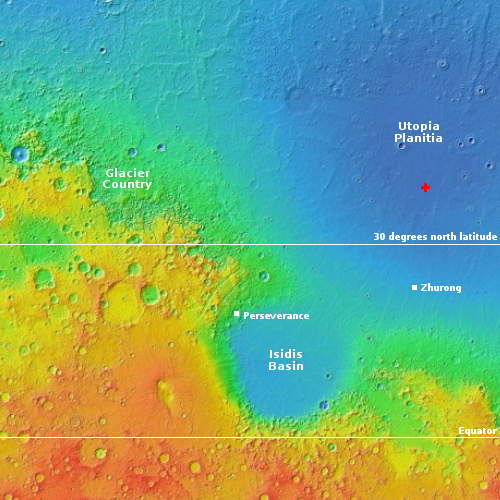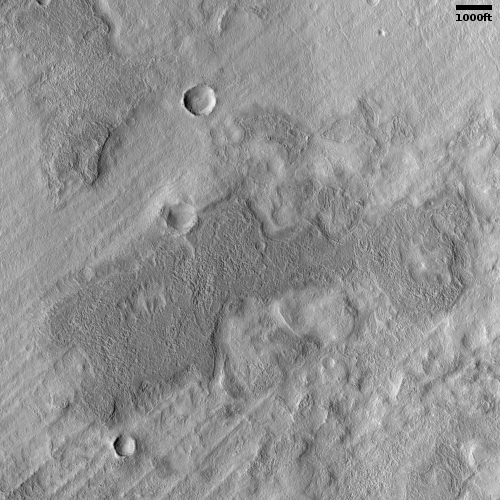Dry barren ground in Martian northern lowlands?
Today’s cool image is intriguing because of what appears to not be there, rather than what is there. The photo to the right, cropped and reduced to post here, was taken on November 3, 2021 by the high resolution camera on Mars Reconnaissance Orbiter (MRO).
At first glance it appears to show a very dry, barren surface. At its base are many parallel grooves running from the southwest to the northeast. On top of these grooves are several more recent crater impacts, as well as several patches of higher bedrock that appears to have been hard enough to resist whatever erosion process caused the groves.
Yet, based on the overview map below, the location of this photo should not be dry and barren, but instead home to a near-surface ice sheet covering everything.

The red cross marks the location of today’s picture, practically in the center of Utopia Basin, Mars’ largest deep impact basin. The location is also at 37 degrees north latitude, in the mid-latitudes where scientists have found ample evidence of near-surface ice, either as glaciers inside craters or flowing down hollows and mesa walls, or as vast ice sheets that cause craters to warp and deform when formed.
At this location however there does not appear to be any evidence of near-surface ice. Instead, the parallel striations suggest that once a glacier flowed here, with the grooves suggesting the direction of flow as its base scratched the bedrock on which it sat, and which now is exposed and completely visible. The patches are places more resistant to that glacial ice flow, and was thus not eroded as the ice moved over it.
Yet, why is this spot so dry, compared to so much of the mid-latitudes where evidence of ice is so frequently found? Maybe past images gave a wrong impression. Maybe they were evidence of confirmation bias on my part, where because scientists are interested in the ice in the mid-latitudes their MRO images tended to favor locations where that ice is found, and thus gave me the incorrect impression that ice covered most of the mid-latitudes. Instead, maybe there is a lot of barren spots in the mid-latitudes, like this one.
Or maybe this barren spot is the exception that proves the rule. Or maybe it isn’t as barren as it appears at first glance, and there is buried ice here, though not obvious.
Your guess is as good as mine. Because at this moment much of what we are doing is guessing, based on the limited information available.
On Christmas Eve 1968 three Americans became the first humans to visit another world. What they did to celebrate was unexpected and profound, and will be remembered throughout all human history. Genesis: the Story of Apollo 8, Robert Zimmerman's classic history of humanity's first journey to another world, tells that story, and it is now available as both an ebook and an audiobook, both with a foreword by Valerie Anders and a new introduction by Robert Zimmerman.
The print edition can be purchased at Amazon or from any other book seller. If you want an autographed copy the price is $60 for the hardback and $45 for the paperback, plus $8 shipping for each. Go here for purchasing details. The ebook is available everywhere for $5.99 (before discount) at amazon, or direct from my ebook publisher, ebookit. If you buy it from ebookit you don't support the big tech companies and the author gets a bigger cut much sooner.
The audiobook is also available at all these vendors, and is also free with a 30-day trial membership to Audible.
"Not simply about one mission, [Genesis] is also the history of America's quest for the moon... Zimmerman has done a masterful job of tying disparate events together into a solid account of one of America's greatest human triumphs."--San Antonio Express-News
Today’s cool image is intriguing because of what appears to not be there, rather than what is there. The photo to the right, cropped and reduced to post here, was taken on November 3, 2021 by the high resolution camera on Mars Reconnaissance Orbiter (MRO).
At first glance it appears to show a very dry, barren surface. At its base are many parallel grooves running from the southwest to the northeast. On top of these grooves are several more recent crater impacts, as well as several patches of higher bedrock that appears to have been hard enough to resist whatever erosion process caused the groves.
Yet, based on the overview map below, the location of this photo should not be dry and barren, but instead home to a near-surface ice sheet covering everything.

The red cross marks the location of today’s picture, practically in the center of Utopia Basin, Mars’ largest deep impact basin. The location is also at 37 degrees north latitude, in the mid-latitudes where scientists have found ample evidence of near-surface ice, either as glaciers inside craters or flowing down hollows and mesa walls, or as vast ice sheets that cause craters to warp and deform when formed.
At this location however there does not appear to be any evidence of near-surface ice. Instead, the parallel striations suggest that once a glacier flowed here, with the grooves suggesting the direction of flow as its base scratched the bedrock on which it sat, and which now is exposed and completely visible. The patches are places more resistant to that glacial ice flow, and was thus not eroded as the ice moved over it.
Yet, why is this spot so dry, compared to so much of the mid-latitudes where evidence of ice is so frequently found? Maybe past images gave a wrong impression. Maybe they were evidence of confirmation bias on my part, where because scientists are interested in the ice in the mid-latitudes their MRO images tended to favor locations where that ice is found, and thus gave me the incorrect impression that ice covered most of the mid-latitudes. Instead, maybe there is a lot of barren spots in the mid-latitudes, like this one.
Or maybe this barren spot is the exception that proves the rule. Or maybe it isn’t as barren as it appears at first glance, and there is buried ice here, though not obvious.
Your guess is as good as mine. Because at this moment much of what we are doing is guessing, based on the limited information available.
On Christmas Eve 1968 three Americans became the first humans to visit another world. What they did to celebrate was unexpected and profound, and will be remembered throughout all human history. Genesis: the Story of Apollo 8, Robert Zimmerman's classic history of humanity's first journey to another world, tells that story, and it is now available as both an ebook and an audiobook, both with a foreword by Valerie Anders and a new introduction by Robert Zimmerman.
The print edition can be purchased at Amazon or from any other book seller. If you want an autographed copy the price is $60 for the hardback and $45 for the paperback, plus $8 shipping for each. Go here for purchasing details. The ebook is available everywhere for $5.99 (before discount) at amazon, or direct from my ebook publisher, ebookit. If you buy it from ebookit you don't support the big tech companies and the author gets a bigger cut much sooner.
The audiobook is also available at all these vendors, and is also free with a 30-day trial membership to Audible.
"Not simply about one mission, [Genesis] is also the history of America's quest for the moon... Zimmerman has done a masterful job of tying disparate events together into a solid account of one of America's greatest human triumphs."--San Antonio Express-News


